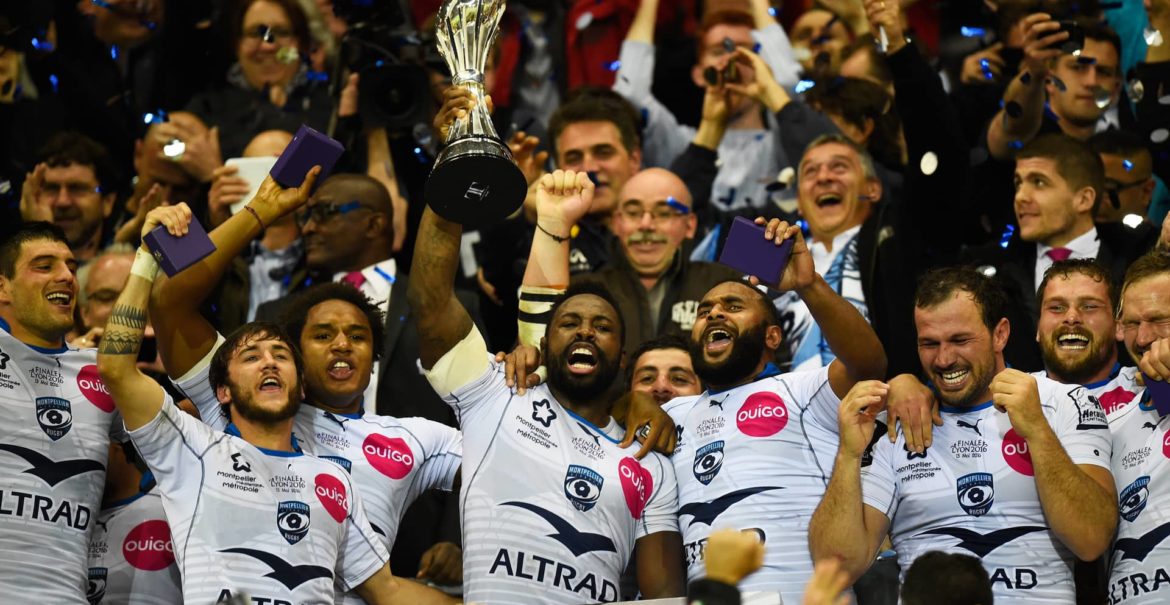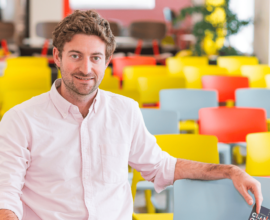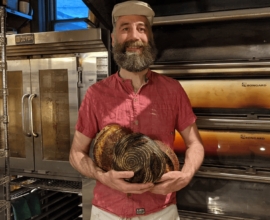Fulgence Ouedraogo
Captain Courage
![]() Reading Time: 9 minutes
Reading Time: 9 minutes
Professional rugby player
Fulgence Ouedraogo is the tireless tackler and captain of the iconic Montpellier Hérault Rugby Club, in the South West of France. Loyal to the club where he started as a pro, “Fufu” has been described as a role model and the soul of Montpellier. In 2011, he led his team to the final of the Top 14, the French professional rugby union club competition… gritting his teeth to ignore the pain of a broken hand. His international record is equally impressive. He has participated in several Six Nations tournaments (in 2008, 2009, 2010 and 2013), won the Under 21 World Cup Championship, and faced the mighty All Blacks in the World Cup final in 2011.
With a height of 1m88 (6’2”) and weighing 99kg (15.5 stone), this gentle giant is highly respected for his integrity and bravery. Learning about his challenging start in life sheds some light onto his special qualities. Born in Burkina Faso, his parents sent him on his own to France when he was three, to be raised by a foster family. They hoped that this upbringing would give him access to a better education. Against all odds, Fulgence has pursued an exceptional sporting journey and he is grateful for how fulfilling his life has turned out to be. But he is still battling with unanswered questions around the merits of his parents’ decision. The athlete refers to rugby as a school of life that has helped him to take control of his destiny equipping him with crucial skills on and off the field. In 2017, in anticipation of his post-sporting career, Fulgence enrolled on an executive education programme at Audencia that he successfully combined with his intensive training regime.
Fulgence shares with us his efforts to make peace with a troublesome past, his passion for the noble sports, and a few of his favourite pleasures as a father raising young children in the countryside.
Do you remember the day that your parents sent you away?
My earliest memories start when I was 4 or 5 so I have no recollection of the separation. After my older sister died, my parents decided to send me to France; they wanted to offer me the best possible chances of a good education. In their mind, I would return to Burkina Faso after my studies. But my life has taken a different turn from the one they had predicted. My father, a primary school teacher, was in touch with a colleague in France who facilitated my transfer to a host family.
I have read that the initials of your mother, brother and sister are tattooed on your shoulder. Is this a sign of forgiveness?
To this day, I still have so many unanswered questions such as why I was the only sibling that my parents sent away. The lack of answers troubled me during my childhood and I struggled to find my place and to grow without the comfort of knowing where my family nest was. Especially now that I am a father, and even though I know that my parents had good intentions, their decision is hard to accept.
I had limited connections with my parents, my brother and my sister who all stayed in Burkina. But on reaching adulthood, I made a conscious attempt to discover my roots. Reconnecting with my family members hasn’t been easy because I don’t know them well and we have never shared any intimate moments. Nevertheless, despite all that has happened, I believe that the emotional links between a mother and son are indestructible and I am glad that we were back in touch. My mother passed away in 2015 when I was preparing for the World Cup and the last time I went to Burkina was for her funeral.
There is no doubt that had I stayed in Burkina, I would never have had the same career. But even more now that I am a father, I appreciate how growing up among your relatives gives you solid foundations. Anyway, there is no point in dwelling on life scenarios that I had no control over. However challenging my childhood was, it made me into who I am today.
Tell us about your childhood and how you got into rugby
I was raised in a village near Montpellier, steeped in the traditions of south western France. I only have the colour of my skin from Africa; I don’t speak the language and I haven’t mastered the cultural codes. Rugby wasn’t a traditional sport in my foster family; they had actually planned to sign me up for tennis lessons, but the club didn’t have enough members to open, so rugby was plan B! I started playing at the age of 6 in a small club near our village.
I am quite shy and have always been rather reserved. For me rugby was primarily a way of having fun with my friends and letting off steam. As a child I didn’t even think of becoming a professional rugby player; I wanted to be a fireman, then a lawyer! But from the age of 16-17, my performance improved rapidly. Our coach identified my potential, I moved to the Montpellier Club, and this is when I first started to dream about becoming a pro. Before I turned 19, I was selected to join the French team and soon afterwards, played my first game with the pros in the first team. In under two years, I went from playing in my little local club to representing my country in international competitions, which was quite surreal. I have remained grounded, thanks to my friends who came to cheer me on at the big games.
Years of success ensued. What are some of the most emotional moments you would like to highlight?
It is hard to pick just a few, but I would go with my first game in the first team for France because it felt such a special privilege. Then the whole of 2011 was memorable. I participated in my first Senior Rugby World cup and we played the final against the host country at the legendary Eden Park Stadium in Auckland. After the national anthems, the All Blacks performed their traditional haka and we decided to respond by staring back and advancing towards them in a V-shaped formation. We suffered a narrow defeat but this match is etched in my memory forever.
You were very young when you were entrusted with the captain’s armband. How did you manage this responsibility?
I had been captain of Montpellier’s 1st team but it was a still shock when I heard I had been named captain of France’s U21 team. Many of the players in the team were professionals with more experience than me, and some had played on the international stage. It was daunting at first, but I learnt on the job. My style consists in leading by example rather than through longwinded speeches. I insist on flawless behaviour in training as well as during matches. This is how I earnt my legitimacy.
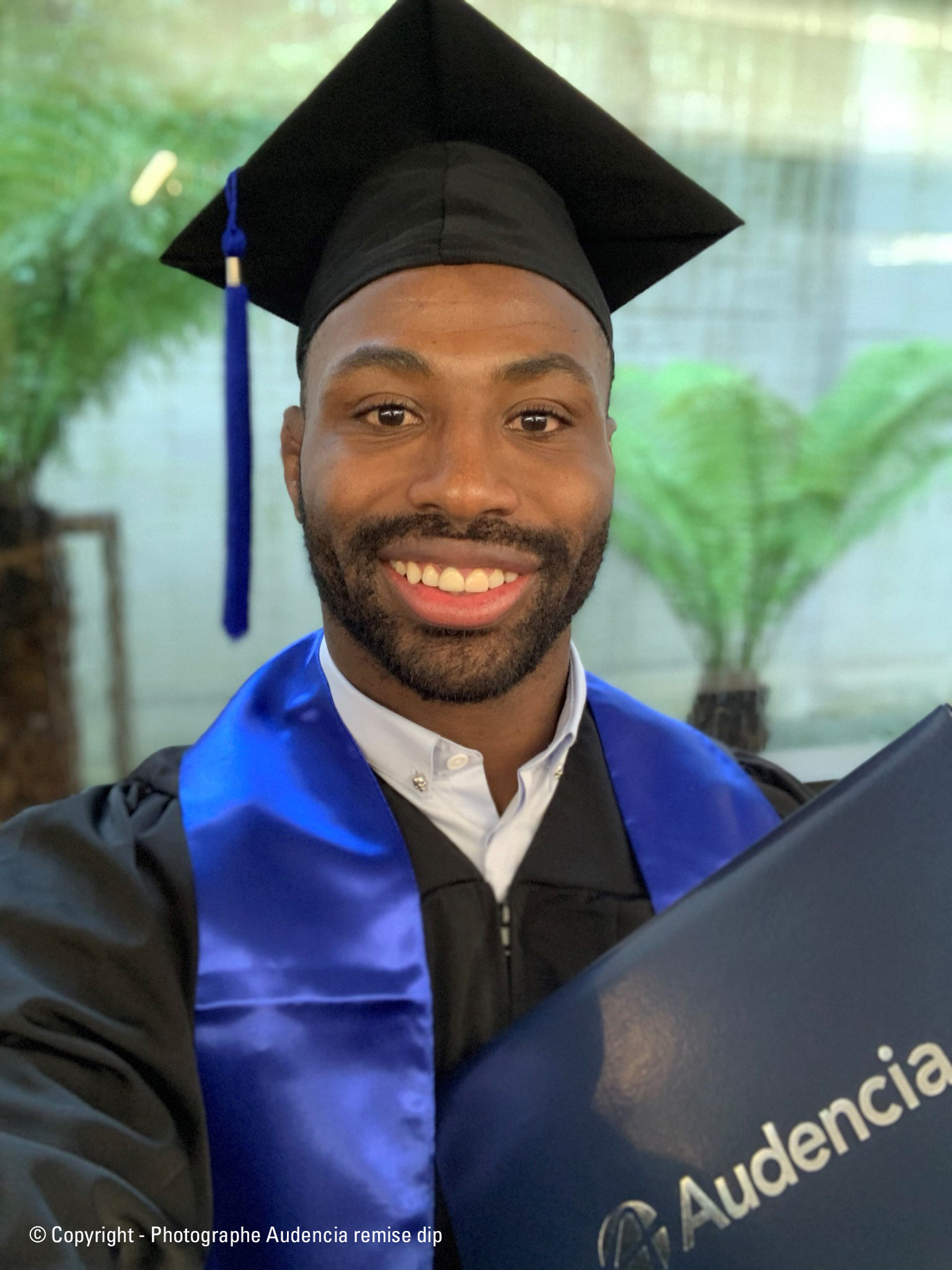
There is a unique ethos in rugby. What makes you so attached to the game?
From the very outset, I have had the privilege of being trained by exceptional coaches who shared their passion for the sport and its values: discipline, respect, integrity, and solidarity. These values build character and transcend into everyday life. Rugby pitches are often where lifelong friendships are forged. It is well known that I am inseparable from Francois Trinh-Duc with whom I have been lucky to follow a similar progression, from our little club at the Pic Saint-Loup, all the way to the national team. But I still count many other of my childhood teammates as my closest friends. As adults, we have all turned out as well-rounded citizens.
Where does the nickname “Captain Courage” come from?
In 2011, I fractured my metacarpals in the semis of the Top 14. It hurt like hell, but there was no way that I would have missed my club’s final a week later. So I strapped my hand tight and bit the bullet! It was not my most serious injury, but it’s the one that people have most commented on, and the one that earned me that nickname.
How have you managed the most challenging phases of your sporting career?
My shoulder injury in 2013 was worrying. I underwent surgery and I contracted a nosocomial infection in hospital. I had to go back to the O.R. a month later, and returning to the pitch was really tough. Difficult relationships in the club, disappointing personal and team performances affected me mentally. As I am not the type of player who easily opens up, I could only rely on myself. The easy way out would have been to quit but I am a man of passion and challenges motivated to train even harder.
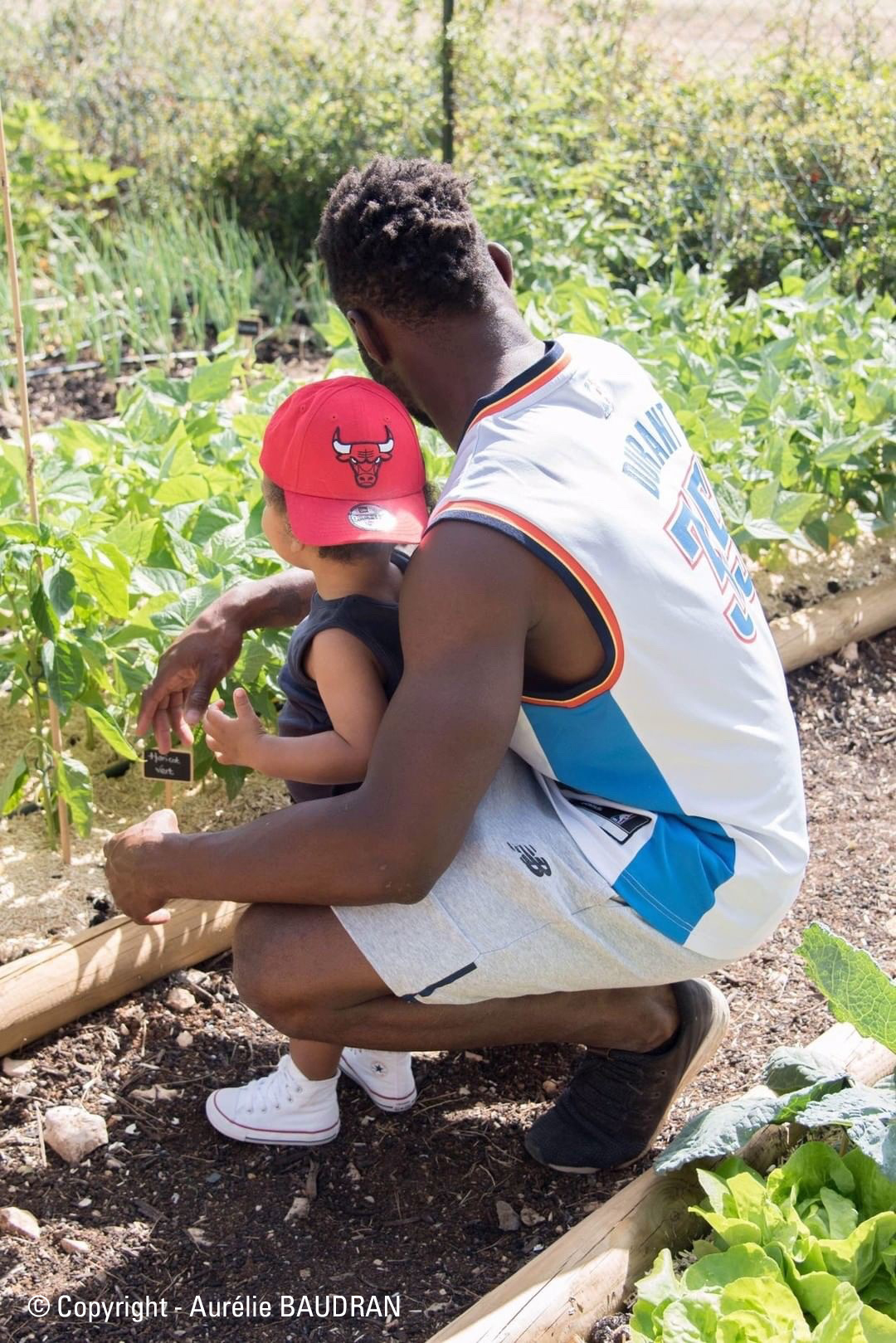
In 2017, you enrolled on an executive education programme at Audencia (DCP*), presumably to prepare your post-rugby years. Is it a programme that you would recommend to other sportspeople?
2017 was a pivotal year on many levels for me. My partner and I moved house, and our son was born in January 2018. Fatherhood changed my priorities, and I felt a stronger sense of responsibility. For the first time, I seriously started to project myself into my post-rugby life. I wanted to be equipped to anticipate my career shift. I signed up to a skills assessment programme and decided to retrain. I found the Audencia programme appealing because its solid curriculum including accounting, HR, negotiation and finance, would give me the keys to a variety of projects. In addition, the remote learning possibility was particularly suited to my heavy and unpredictable training schedule.
*DCP [Director of a Profit Centre] is 9, 12 or 15 month programme, in French, offered by Audencia Executive Education
But going back to school was testing! I was coming home drained after a day’s training. I was often alone with my baby so I had to put him to bed as early as I could to start studying. Most of the students in the programme had some knowledge of management as well as some business experience. For me, this universe was totally unfamiliar. I felt so behind and initially I had to google definitions which seemed straightforward to the others. I resorted to asking my peers for help… that was quite a first for me! Luckily, my classmates were great, understanding, and supportive.
It took a lot of resilience but I am proud to have persevered. The programme gave me the vocabulary, the contacts, the mindset and the confidence to start a business venture. I would recommend this formula to other sportsmen, but I would just warn them that the experience can feel isolating so it requires self-discipline. I only came to the Nantes campus once, for the graduation ceremony. There was a great atmosphere that day. We were all so happy to meet each other -at last- in the flesh, and some students even queued up to ask me to sign autographs!
I started the programme with a few ideas in event management, and I refined one during the year. Then Covid threw a spanner in the works. I am now working on another one that could work via video. More will be revealed later…
What does a typical working day look like for you? And a “down day”?
On a training day, I usually leave home at 7am. We start with some stretching, a warmup, and exercises to test our fitness level. We have breakfast together, and this is followed by a video session, a weight workout, the first training, then lunch, another video session, another training, and the post training video session. We finish off with stretching, physio and balneotherapy. I don’t get home until 6.30pm. So you see, the regime is more intense that many people realise! I like to spend as much of my downtime outside as possible. I was raised in the countryside, I love fishing and tending to my vegetable garden. And spending some quality time with my family, close to nature.
What brings you purpose and meaning in your everyday life?
My children are 2 and 3 and I am concerned about the environment we are going to leave them. Our planet is precious and I try to teach them what can be done at our level to protect it. I am far from a perfect environmentalist, but I focus on sharing with them life’s simplest pleasures. I show them the little gestures that create attachment to the natural world. I want them to understand the importance of respect and compassion. When my kids come back from nursery, the first thing they ask is to get the eggs from the henhouse, to pet the rabbit and to pick raspberries. Nothing makes me happier.
Where do you see yourself in 5 or 10 years?
I am actively reflecting on this. I hope to still have 1 or 2 seasons of rugby ahead of me. When this is over, I might relocate, even maybe abroad to experience another culture, but nothing is set in stone yet. As for deciding on my future professional adventure, I know it will be difficult because when you have lived off our passion all your life, it’s hard to imagine a project that will be as motivating. I doubt I will ever be able to re-live the same intense sensations that I have enjoyed on the playing field. But I will still look for a role that can provide me with emotions and pleasure.
What are the two black and white photos hanging on the wall behind you?
One is a picture of me as young boy having a whale of a time on the pitch with my friends. The other is a portrait of Mohammed Ali in the ring. He is the ultimate embodiment of discipline and mental strength, and an icon to many athletes.
